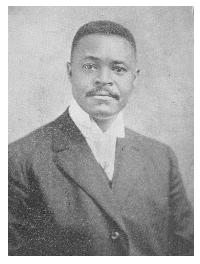

He laid the foundation of his education at Raleigh, N. C., in the public schools. Later he studied at West Virginia Collegiate Institute, W. Va., and passed from there to Storer College at Harper's Ferry, where he spent three years. For his professional course he returned to his native State and matriculated in the Leonard School of Medicine, and spent one year, then returned to the Leonard School of Pharmacy of Shaw University where he won his Ph.G. degree in 1911. Most of his vacations had been spent in West Virginia with his brother-in-law, Dr. G. N. Marshall who had established at Keystone the first Negro drug store in West Virginia. So by the time he had completed his course, he had also had such practical experience as to enable him to enter upon his work without delay. During the first year after his graduation he found work in North Carolina at Wilson, and later at Greensboro. He recognized the growing importance of the coal fields of West Virginia, however, and in 1912 settled at Keystone where he has since resided.
On September 28, 1912, he was married to Miss Trulia B. Jones, of Cleveland, Ohio, who was educated at Storer College and at Avery College and who is an accomplished teacher. In politics Dr. Bridgeford is a Republican and in religion a Presbyterian. Among the secret and benevolent orders he is identified with the Masons, Pythians and the St. Lukes. He belongs to the West Virginia State Medical, Dental and Pharmaceutical Association and to the local organization known as the Flat Top Medical Society. His favorite reading is along the line of the English classics.
With every student of racial conditions, he, of course, realizes that there is still much to be done in the way of progress. He believes that the next great forward movement should be along the line of organization and cooperation.